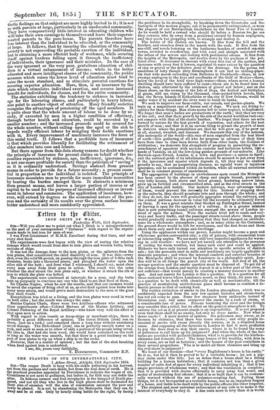rttttr tu tht Cahn.
IRON SHIPS OF WAR.
Tunbridge if-W.9,11th September.
Sin—Will you allow me to point out what I think is a misapprehension on the part of your correspondent " Cerberus " with regard to the experi- ments made to test iron for men-of-war.
I was First-Lieutenant of H.M.S. Excellent during that time, and saw every shot fired. The experiments were first begun with the view of testing the relative damage which would result from shot to iron plates and wooden butts, being sections of ships. It was not the damage done to the iron plates, or the splinters from the
iron plates, that constituted the chief disability of iron. It was this—every shot, even the solid 68-pound, on passing through the iron plate of 5-8ths inch diameter, broke into a thousand pieces, and ploughed the water upon the other side of the butt ; and from what I witnessed, I should say, must deur every man away from their guns in action. The result was the same whether the shot struck the iron plate only, or whether it struck the rib of iron to which the plate was bolted.
The experiments were continued at intervals for a year, and the butts kept up purposely to convince any one who liked to see shot fired at them.
Sir Charles Napier, when he saw the results, said that our enemies would be saved the expense of firing shell at us, as shot fired against iron broke into many more pieces and would prove more destructive to the men at the guns than shell would.,
Kamptulicon was tried as a lining, and the iron plates were cased in wood on both sides - but the result was always the same. Besides Captain Chads, there were two Artillery-officers who witnessed these experiments often—Colonel Stevens of the Marine Artillery, and Colonel Pickering of the Royal Artillery—who know very well the effect of shot upon men in action. With regard to iron vessels as troop-ships or merchant-ships, there is probably a great difference of opinion. The Great Britain (iron) ran on shore, (not on a rock,) and remained there a long time without sustaining mech damage. The Birkenhead (iron) ran in perfectly smooth water on a rock, and sank so soon as to allow of only a portion of the people being saved. My idea is, that had she been wood, she would have remained on the rock as long as the water was smooth, but that there is a great tendency on the part of iron plates to rip up when a ship is on the rocks. However, that is a matter of opinion ; but the fact of the shot breaking when fired against iron is undoubted. I am, Sir, yours very faithfully,
T. liODGNINSON, Commander R.N.


























 Previous page
Previous page